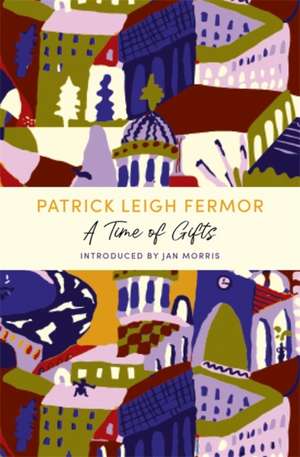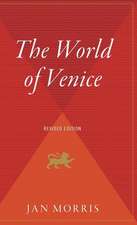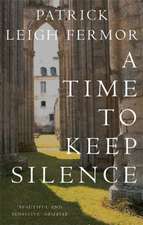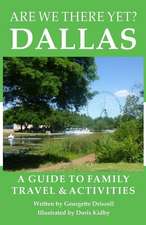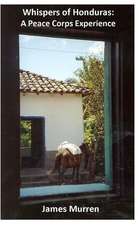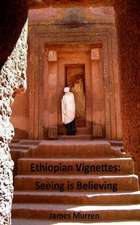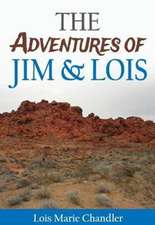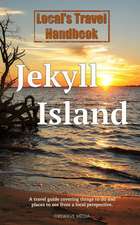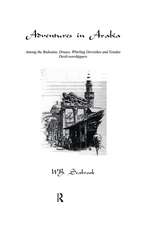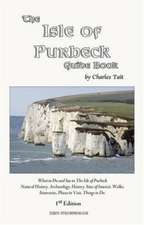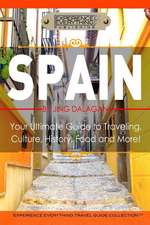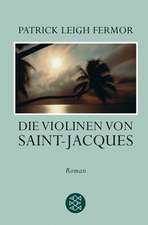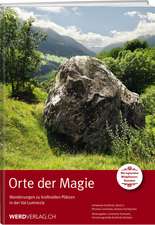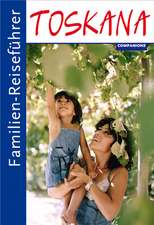A Time of Gifts
Autor Patrick Leigh Fermoren Limba Engleză Paperback – 5 noi 2021
'[This] gloriously ornate account of that epic journey is a classic' ROBERT MACFARLANE
'The feeling of being lost in time and geography with months and years hazily sparkling ahead is a prospect of inconjecturable magic.'
In 1933, aged eighteen, Patrick Leigh Fermor set out on his 'great trudge', a year-long journey by foot from the Hook of Holland to Istanbul. Three decades later he wrote A Time of Gifts, the sparklingly original account of the first part of this youthful adventure, which took him through the Low Countries, up the Rhine, through Germany, down the Danube, through Austria and Czechoslovakia, and as far as Hungary.
Alone, carrying only a rucksack and with a small allowance of only a pound a week, Fermor had planned to sleep rough - to live 'like a tramp, a pilgrim, or a wandering scholar' - but a chance introduction in Bavaria led to comfortable stays in castles, and provided a glimpse of the old Europe of princes and peasants.
Hailed as a masterpiece, A Time of Gifts is in part a coming-of-age memoir, but it is also a rich and compelling portrait of a continent that - despite its resplendent domes and monasteries, its great rivers and grand cities - was soon to be swept away by war, modernisation and profound social change.
'Not only is this journey one of physical adventure but of cultural awakening. Architecture, art, genealogy, quirks of history and language are all devoured -- and here passed on -- with a gusto uniquely his' COLIN THUBRON, SUNDAY TIMES
'One of the most romantic books of the twentieth century, Patrick Leigh Fermor's account of a long walk across Europe is also a literary treasure, a rich blend of action and observation' GUARDIAN
| Toate formatele și edițiile | Preț | Express |
|---|---|---|
| Paperback (2) | 62.72 lei 3-5 săpt. | +31.11 lei 7-13 zile |
| HODDER AND STOUGHTON LTD – 5 noi 2021 | 62.72 lei 3-5 săpt. | +31.11 lei 7-13 zile |
| NEW YORK REVIEW OF BOOKS – 30 sep 2005 | 100.18 lei 3-5 săpt. | |
| Hardback (1) | 84.71 lei 3-5 săpt. | +45.17 lei 7-13 zile |
| John Murray Press – 10 iun 2021 | 84.71 lei 3-5 săpt. | +45.17 lei 7-13 zile |
Preț: 62.72 lei
Preț vechi: 82.46 lei
-24% Nou
Puncte Express: 94
Preț estimativ în valută:
12.00€ • 12.56$ • 9.93£
12.00€ • 12.56$ • 9.93£
Carte disponibilă
Livrare economică 15-29 martie
Livrare express 01-07 martie pentru 41.10 lei
Preluare comenzi: 021 569.72.76
Specificații
ISBN-13: 9781529369526
ISBN-10: 1529369525
Pagini: 304
Ilustrații: frontispiece and map
Dimensiuni: 128 x 194 x 30 mm
Greutate: 0.28 kg
Editura: HODDER AND STOUGHTON LTD
Colecția John Murray Press
ISBN-10: 1529369525
Pagini: 304
Ilustrații: frontispiece and map
Dimensiuni: 128 x 194 x 30 mm
Greutate: 0.28 kg
Editura: HODDER AND STOUGHTON LTD
Colecția John Murray Press
Descriere
On Foot to Constantinople from the Hook of Holland to the Middle Danube. The great travel classic, first published in 1977 and recounting an epic journey of nearly 50 years before.
Notă biografică
Patrick Leigh Fermor (1915-2011) was an intrepid traveler, a heroic soldier, and a writer with a unique prose style. After his stormy schooldays, followed by the walk across Europe to Constantinople that begins in A Time of Gifts (1977) and continues through Between the Woods and the Water (1986), he lived and traveled in the Balkans and the Greek Archipelago. His books Mani (1958) and Roumeli (1966) attest to his deep interest in languages and remote places. In the Second World War he joined the Irish Guards, became a liaison officer in Albania, and fought in Greece and Crete. He was awarded the DSO and OBE. He lived partly in Greece—in the house he designed with his wife, Joan, in an olive grove in the Mani—and partly in Worcestershire. He was knighted in 2004 for his services to literature and to BritishߝGreek relations.
Jan Morris was born in 1926, is Anglo-Welsh, and lives in Wales. She has written some forty books, including the Pax Britannica trilogy about the British Empire; studies of Wales, Spain, Venice, Oxford, Manhattan, Sydney, Hong Kong, and Trieste; six volumes of collected travel essays; two memoirs; two capricious biographies; and a couple of novels—but she defines her entire oeuvre as “disguised autobiography.” She is an honorary D.Litt. of the University of Wales and a Commander of the British Empire. Her memoir Conundrum is available as a New York Review Book Classic.
Jan Morris was born in 1926, is Anglo-Welsh, and lives in Wales. She has written some forty books, including the Pax Britannica trilogy about the British Empire; studies of Wales, Spain, Venice, Oxford, Manhattan, Sydney, Hong Kong, and Trieste; six volumes of collected travel essays; two memoirs; two capricious biographies; and a couple of novels—but she defines her entire oeuvre as “disguised autobiography.” She is an honorary D.Litt. of the University of Wales and a Commander of the British Empire. Her memoir Conundrum is available as a New York Review Book Classic.
Recenzii
"This is a glorious feast, the account of a walk in 1934 from the Hook of Holland to what was then Constantinople. The 18-year-old Fermor began by sleeping in barns but, after meeting some landowners early on, got occasional introductions to castles. So he experienced life from both sides, and with all the senses, absorbing everything: flora and fauna, art and architecture, geography, clothing, music, foods, religions, languages. Writing the book decades after the fact, in a baroque style that is always rigorous, never flowery, he was able to inject historical depth while still retaining the feeling of boyish enthusiasm and boundless curiosity. This is the first of a still uncompleted trilogy; the second volume, Between the Woods and the Water, takes him through Hungary and Romania; together they capture better than any books I know the remedial, intoxicating joy of travel." — Thomas Swick, South Florida Sun-Sentinel
“Recovers the innocence and the excitement of youth, when everything was possible and the world seemed luminescent with promise. ...Even more magical...through Hungary, its lost province of Transylvania, and into Romania... sampling the tail end of a languid, urbane and anglophile way of life that would soon be swept away forever.” —Jeremy Lewis, Literary Review
“A book so good you resent finishing it.” —Norman Stone
"The greatest of living travel writers…an amazingly complex and subtle evocation of a place that is no more." — Jan Morris
"In these two volumes of extraordinary lyrical beauty and discursive, staggering erudition, Leigh Fermor recounted his first great excursion… They’re partially about an older author’s encounter with his young self, but they’re mostly an evocation of a lost Mitteleuropa of wild horses and dark forests, of ancient synagogues and vivacious Jewish coffeehouses, of Hussars and Uhlans, and of high-spirited and deeply eccentric patricians with vast libraries (such as the Transylvanian count who was a famous entomologist specializing in Far Eastern moths and who spoke perfect English, though with a heavy Scottish accent, thanks to his Highland nanny). These books amply display Leigh Fermor’s keen eye and preternatural ear for languages, but what sets them apart, besides the utterly engaging persona of their narrator, is his historical imagination and intricate sense of historical linkage…Few writers are as alive to the persistence of the past (he’s ever alert to the historical forces that account for the shifts in custom, language, architecture, and costume that he discerns), and I’ve read none who are so sensitive to the layers of invasion that define the part of Europe he depicts here. The unusual vantage point of these books lends them great poignancy, for we and the author know what the youthful Leigh Fermor cannot: that the war will tear the scenery and shatter the buildings he evokes; that German and Soviet occupation will uproot the beguiling world of those Tolstoyan nobles; and that in fact very few people who became his friends on this marvelous and sunny journey will survive the coming catastrophe." — Benjamin Schwarz, The Atlantic
Praise for Patrick Leigh Fermor:
"One of the greatest travel writers of all time”ߝThe Sunday Times
“A unique mixture of hero, historian, traveler and writer; the last and the greatest of a generation whose like we won't see again.”ߝGeographical
“The finest traveling companion we could ever have . . . His head is stocked with enough cultural lore and poetic fancy to make every league an adventure.” ߝEvening Standard
If all Europe were laid waste tomorrow, one might do worse than attempt to recreate it, or at least to preserve some sense of historical splendor and variety, by immersing oneself in the travel books of Patrick Leigh Fermor.”—Ben Downing, The Paris Review
“Recovers the innocence and the excitement of youth, when everything was possible and the world seemed luminescent with promise. ...Even more magical...through Hungary, its lost province of Transylvania, and into Romania... sampling the tail end of a languid, urbane and anglophile way of life that would soon be swept away forever.” —Jeremy Lewis, Literary Review
“A book so good you resent finishing it.” —Norman Stone
"The greatest of living travel writers…an amazingly complex and subtle evocation of a place that is no more." — Jan Morris
"In these two volumes of extraordinary lyrical beauty and discursive, staggering erudition, Leigh Fermor recounted his first great excursion… They’re partially about an older author’s encounter with his young self, but they’re mostly an evocation of a lost Mitteleuropa of wild horses and dark forests, of ancient synagogues and vivacious Jewish coffeehouses, of Hussars and Uhlans, and of high-spirited and deeply eccentric patricians with vast libraries (such as the Transylvanian count who was a famous entomologist specializing in Far Eastern moths and who spoke perfect English, though with a heavy Scottish accent, thanks to his Highland nanny). These books amply display Leigh Fermor’s keen eye and preternatural ear for languages, but what sets them apart, besides the utterly engaging persona of their narrator, is his historical imagination and intricate sense of historical linkage…Few writers are as alive to the persistence of the past (he’s ever alert to the historical forces that account for the shifts in custom, language, architecture, and costume that he discerns), and I’ve read none who are so sensitive to the layers of invasion that define the part of Europe he depicts here. The unusual vantage point of these books lends them great poignancy, for we and the author know what the youthful Leigh Fermor cannot: that the war will tear the scenery and shatter the buildings he evokes; that German and Soviet occupation will uproot the beguiling world of those Tolstoyan nobles; and that in fact very few people who became his friends on this marvelous and sunny journey will survive the coming catastrophe." — Benjamin Schwarz, The Atlantic
Praise for Patrick Leigh Fermor:
"One of the greatest travel writers of all time”ߝThe Sunday Times
“A unique mixture of hero, historian, traveler and writer; the last and the greatest of a generation whose like we won't see again.”ߝGeographical
“The finest traveling companion we could ever have . . . His head is stocked with enough cultural lore and poetic fancy to make every league an adventure.” ߝEvening Standard
If all Europe were laid waste tomorrow, one might do worse than attempt to recreate it, or at least to preserve some sense of historical splendor and variety, by immersing oneself in the travel books of Patrick Leigh Fermor.”—Ben Downing, The Paris Review
